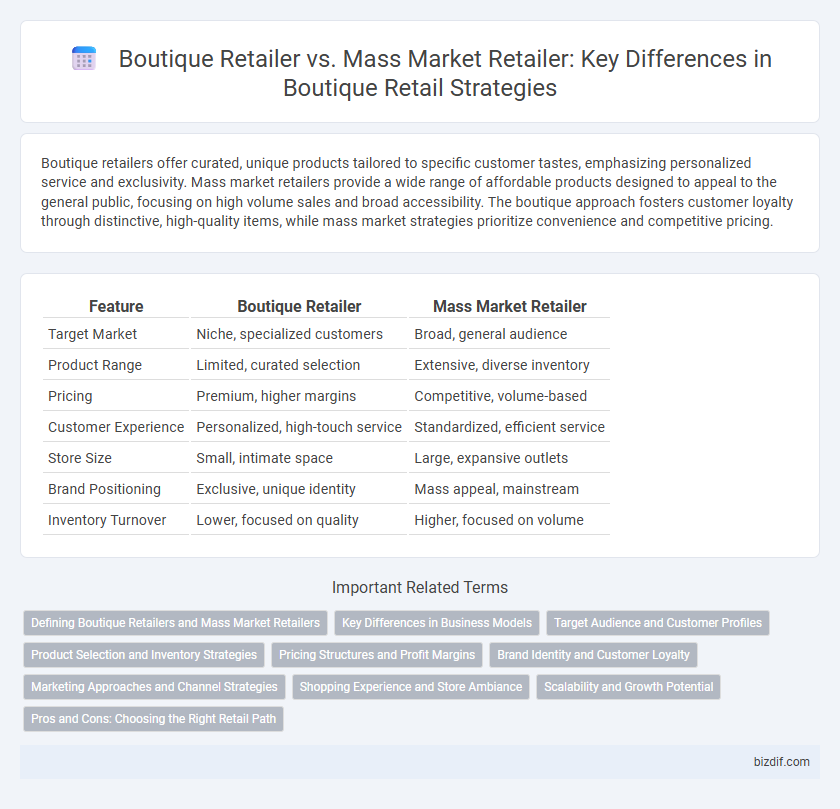Boutique retailers offer curated, unique products tailored to specific customer tastes, emphasizing personalized service and exclusivity. Mass market retailers provide a wide range of affordable products designed to appeal to the general public, focusing on high volume sales and broad accessibility. The boutique approach fosters customer loyalty through distinctive, high-quality items, while mass market strategies prioritize convenience and competitive pricing.
Table of Comparison
| Feature | Boutique Retailer | Mass Market Retailer |
|---|---|---|
| Target Market | Niche, specialized customers | Broad, general audience |
| Product Range | Limited, curated selection | Extensive, diverse inventory |
| Pricing | Premium, higher margins | Competitive, volume-based |
| Customer Experience | Personalized, high-touch service | Standardized, efficient service |
| Store Size | Small, intimate space | Large, expansive outlets |
| Brand Positioning | Exclusive, unique identity | Mass appeal, mainstream |
| Inventory Turnover | Lower, focused on quality | Higher, focused on volume |
Defining Boutique Retailers and Mass Market Retailers
Boutique retailers specialize in offering unique, high-quality, and often handcrafted products targeted at niche markets, emphasizing personalized customer service and curated selections. Mass market retailers prioritize volume, providing a wide range of affordable, standardized products to a broad audience through extensive distribution channels. The distinct focus of boutique retailers on exclusivity and specialized goods contrasts with the mass market's emphasis on accessibility and economies of scale.
Key Differences in Business Models
Boutique retailers emphasize specialized, high-quality products with personalized customer service and curated selections targeting niche markets, whereas mass market retailers focus on high-volume sales with broad product assortments catering to a wide customer base. Boutique stores often operate on smaller scales with higher profit margins per item, while mass market retailers rely on economies of scale and lower prices to drive extensive customer traffic. The boutique model prioritizes exclusivity and brand experience, contrasting with mass market approaches that emphasize accessibility and widespread distribution.
Target Audience and Customer Profiles
Boutique retailers target niche markets, catering to customers seeking unique, high-quality, and often handcrafted products, typically attracting affluent individuals with specific tastes and preferences. Mass market retailers focus on broad audiences, offering a wide range of standardized goods at competitive prices, appealing to budget-conscious shoppers seeking convenience and variety. Customer profiles in boutique retail often include trendsetters and discerning buyers, whereas mass market customers prioritize accessibility and affordability.
Product Selection and Inventory Strategies
Boutique retailers curate a highly specialized product selection, focusing on unique, high-quality items that cater to niche markets and distinct customer preferences. Their inventory strategies emphasize limited stock and frequent rotation to maintain exclusivity and reduce overstock risks. In contrast, mass market retailers prioritize a broad product assortment with high volume inventory, leveraging economies of scale to maximize accessibility and meet diverse consumer demands.
Pricing Structures and Profit Margins
Boutique retailers typically adopt premium pricing structures, focusing on exclusivity and high-quality products, which results in higher profit margins per item compared to mass market retailers. Mass market retailers rely on volume sales with lower price points and thinner profit margins to attract a broad customer base. This strategic difference allows boutiques to maintain brand prestige while mass retailers capitalize on economies of scale.
Brand Identity and Customer Loyalty
Boutique retailers cultivate a strong brand identity by offering unique, curated products that emphasize exclusivity and personalized service, fostering deep customer loyalty. Mass market retailers prioritize broad appeal with standardized products and competitive pricing, often resulting in weaker brand differentiation and lower customer retention. The focused brand narrative of boutique stores enhances emotional connections, driving repeat business and a dedicated customer base.
Marketing Approaches and Channel Strategies
Boutique retailers emphasize personalized marketing approaches, leveraging targeted social media campaigns and exclusive events to create a unique customer experience. Their channel strategies prioritize direct-to-consumer sales through intimate, curated storefronts and specialized e-commerce platforms. In contrast, mass market retailers rely on broad-reaching advertising, large-scale promotions, and multi-channel distribution including wide physical presence and major online marketplaces.
Shopping Experience and Store Ambiance
Boutique retailers offer a highly personalized shopping experience with curated product selections and intimate store layouts that emphasize unique design elements and a cozy ambiance. In contrast, mass market retailers prioritize efficiency and variety, often featuring large, open spaces with standardized displays that facilitate quick shopping and high foot traffic. The boutique environment fosters customer engagement and emotional connection, while mass market settings focus on convenience and broad appeal.
Scalability and Growth Potential
Boutique retailers specialize in curated, unique products that target niche markets, offering personalized customer experiences but face limited scalability due to smaller inventory and higher per-unit costs. Mass market retailers benefit from economies of scale, broad product ranges, and extensive distribution networks, enabling rapid growth and market penetration. The scalability of boutique retailers is constrained by their focus on exclusivity and specialized demand, whereas mass market retailers leverage volume sales and operational efficiency for expansive growth potential.
Pros and Cons: Choosing the Right Retail Path
Boutique retailers offer personalized customer experiences and curated, unique product selections, fostering brand loyalty and higher profit margins per item. Mass market retailers benefit from economies of scale, enabling lower prices and wider product variety but often at the expense of personalized service and product exclusivity. Choosing the right retail path depends on target demographics, brand positioning, and long-term business goals, balancing niche appeal against broad market reach.
Boutique Retailer vs Mass Market Retailer Infographic

 bizdif.com
bizdif.com